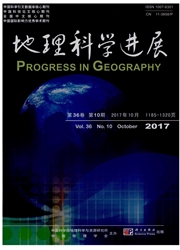

 中文摘要:
中文摘要:
利用中国1988、1995、2000和2005年县级面板数据构建了包含气候变化因素、投入要素、自然环境条件变量的面板数据随机效应计量模型,并利用该模型研究了中国县域气候变化(主要以1988-2005年间气温、降水变动)对粮食产量的影响。研究表明,从整体上看,一定幅度内的气温上升和降水增加对我国粮食产量变动有正向作用。将气温、降水变动的影响分解到不同省份上后,可以发现气温、降水变动对中国县域粮食产量的影响存在明显的区域分异特征。气温上升和降水量的增加对中国东北、华北以及西北部省份的粮食产量提升有利,对其他省区则会产生小幅负面影响。对气温、降水变动分季进行考察的结果表明,气温、降水变动对中国县域粮食产量的影响存在季节性差异,譬如春季气温变动对中国县域粮食产量的影响并不显著,但是夏、秋、冬3季的气温对中国县域粮食产量有显著的影响,不过其影响的程度与效果各异。春、夏两季降水对中国粮食产量变化存在显著影响。
 英文摘要:
英文摘要:
This paper aims to explore the relationship between the fluctuations of climate change identified by annually fluctuations of air temperature and precipitation during the study time period and the changes of grain production at counties of China by using panel data models,based on survey data across all counties in 31 provinces(except for Taiwan,Hong Kong and Macau) for the four time periods of 1988,1995,2000 and 2005,which consists of climate variables,social and economic variables and geophysical variables.The estimation results show that the average impacts of air temperatures and the precipitation are positive.However,based on panel data models regressed at the scale of different provinces,marginal increases in temperature and rainfall have very different effects on grain production in different regions.Warming is beneficial to the North China,Northwest China and Northeast China;in contrast,higher temperatures are harmful to grain production in the South and East China.More rain is likely to be beneficial to the Northeast China,Northwest China and Central China,but will harm farmers in the remaining regions.Marginal increases in temperature and rainfall have very different effects in different seasons.For example,there aren't distinct impacts of spring temperature on grain production.However,based on the panel data model consisting of seasonal climate variables,results suggest that the average higher temperature in summer and winter is negative for grain production in China,but drastic raise of temperature in summer and winter is beneficial to grain production.In contrast,the impact of average autumn temperature is opposite to that of summer and winter.Except for the impacts of rainfall in spring and summer on grain production,the impacts of rainfall in other seasons on grain production aren't distinct.The results suggest that social factors and geophysical factors may affect the grain production to a certain extent as well.
 同期刊论文项目
同期刊论文项目
 同项目期刊论文
同项目期刊论文
 期刊信息
期刊信息
